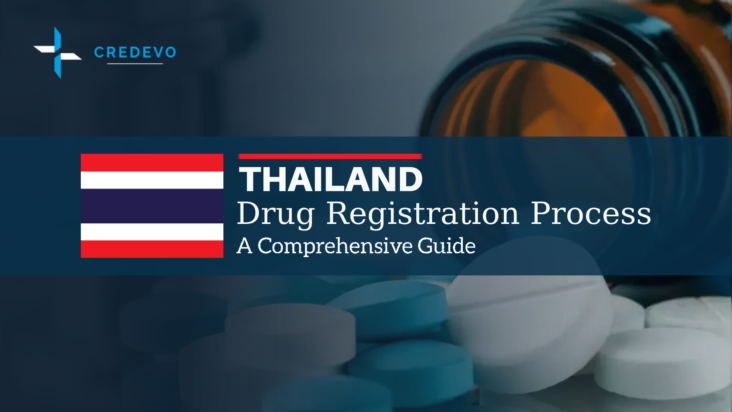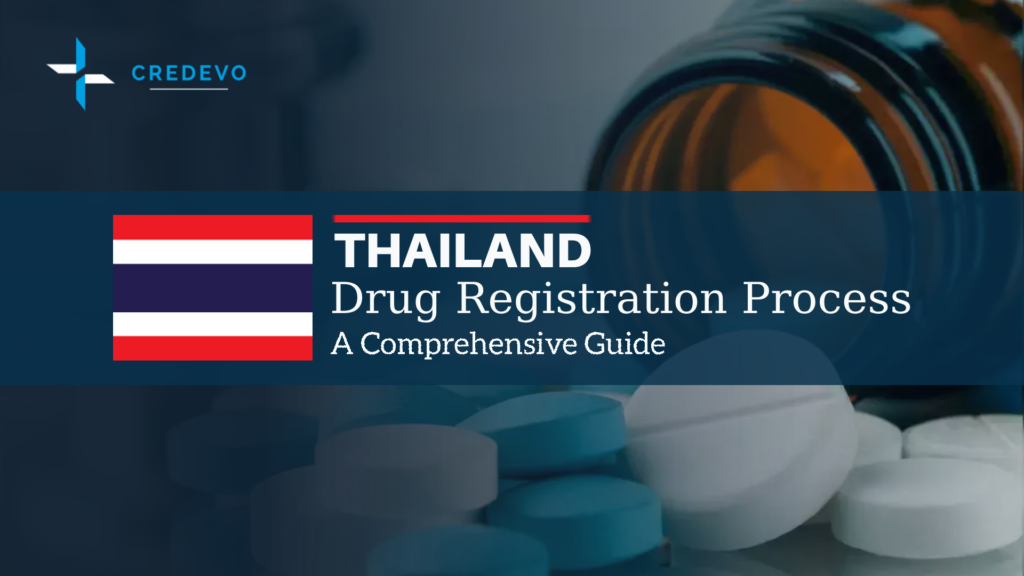New Drug Registration Process in Thailand: A Guide To Market Entry

The new drug registration process in Thailand is complex, but with careful planning, expertise, and assistance from regulatory consultants or legal professionals, it can be navigated more easily and efficiently.

The market for new drugs in Thailand is growing steadily, with an increasing demand for innovative pharmaceutical products. The market for new drugs accounts for approximately 30% of the total pharmaceutical market in Thailand.
This percentage reflects the country’s willingness to embrace new medical advancements and its commitment to improving healthcare outcomes for its population.
The need for new drugs is explained by several factors, including the aging population’s complex healthcare needs and the rise in chronic illnesses like diabetes and hypertension, which is pressuring the government to concentrate on innovative therapies.
Advantages of marketing a drug in Thailand
Thailand offers a promising market for new drugs as they continue to embrace innovative medical solutions, with new drug market percentages. Benefit from the streamlined regulatory process and lower manufacturing costs, maximizing profit potential.
Following are some advantages of marketing a new drug in Thailand.
- Market potential: Thailand’s large population and healthcare needs present a significant market opportunity for pharmaceutical companies.
- Regulatory environment: Thailand has less stringent regulatory requirements and potentially speeds up the approval process for new drugs.
- Lower costs: Manufacturing and distribution costs in Thailand are generally lower, allowing for potentially higher profit margins.
- Growing healthcare infrastructure: Thailand’s healthcare system provides better access to medical facilities and professionals for marketing and distribution.
- Medical tourism: Thailand is a popular destination for medical tourism, providing an additional avenue for marketing and selling pharmaceutical products.
- Collaboration opportunities: Pharmaceutical companies can collaborate with local research institutions and healthcare providers to conduct clinical trials and promote their drugs effectively in the Thai market.
- Cultural acceptance: Thai consumers often trust and value healthcare products from reputable international brands, making it easy to market new drugs.
Classification of drugs in Thailand
There are two main categories of drugs in Thailand.
- New drugs
- Generic drugs
Understanding the two categories’ differences is essential for regulatory purposes and market access. Here’s a simplified explanation of how new and generic drugs are classified in Thailand.
New drugs
New drugs in Thailand refer to pharmaceutical products that contain active substances not previously approved for medical use in the country. The registration process of a new drug involves rigorous evaluation by the Food and Drug Administration (FDA) to ensure its safety, efficacy, and quality before it is marketed and distributed.
Generic drugs
Generic drugs are pharmaceutical products that contain the same active ingredients, dosage form, strength, route of administration, and intended use as the original brand-name drug. However, generic drugs are typically marketed under their chemical or generic names and are often less expensive than brand-name drugs.
| Examples of new drugs | Examples of generic drugs |
|---|---|
| New Chemical Entities (NCE) New Indication (NI) New Combination (NCO) Delivery System (ND) New Route of Administration (NR) New Dosage Form (NDOS) New Strength (NS) | Same active ingredient(s) Same dosage form Same strength Same route of administration Same conditions of use |
Interested in learning about the generic drug registration process in Thailand? Click here.
Regulatory authority and compliance for new drug registration in Thailand
The regulatory authority for new drug registration in Thailand is the Thai Food and Drug Administration (FDA). Companies seeking to market new drugs must adhere to stringent compliance requirements set forth by the FDA.
- This process involves submitting comprehensive documentation, including clinical trial data and manufacturing specifications, for evaluation. Once approved, the drug can be marketed and distributed in Thailand.
- Compliance with FDA regulations ensures the safety, efficacy, and quality of pharmaceutical products available in the Thai market, fostering consumer trust and confidence in the healthcare system.
- Manufacturers must adhere to GMP standards to ensure the quality and consistency of drug products. Non-compliance can lead to regulatory penalties, product recalls, and damage to the reputation of pharmaceutical companies.
Registration process for new drug registration in Thailand
Registering a new drug in Thailand is crucial to ensure its safety and effectiveness. The process, overseen by the Thai Food and Drug Administration (FDA), involves submitting detailed documentation, including clinical trial data and manufacturing information.
The FDA evaluates each submission carefully to assess the risks and benefits of the drug. Once approved, the drug can be marketed and distributed in Thailand.
The steps of the process are discussed below.
Step 1: Pre-marketing
Licensing
The Drug Act mandates that individuals intending to sell, produce, or import drugs into Thailand must acquire a license from the Thai FDA that includes licenses for manufacturing, selling, and importing drugs.
Preclinical research
Before applying for registration, pharmaceutical companies conduct preclinical research to gather data on the safety and effectiveness of the new drug in laboratory settings and animal studies.
Clinical trials
Clinical trials evaluate the new drug’s safety and efficacy in humans. These trials follow strict protocols and involve different phases to assess the drug’s performance.
Advertising control
Advertisements and promotional materials for drugs must be truthful and accurate. All advertisements must receive approval from the Thai FDA before being distributed.
Step 2: Registration process
Only authorized license holders are eligible to apply for drug registration. Once sufficient preclinical and clinical study data are collected, the pharmaceutical company submits a registration application to the FDA.
The application includes comprehensive information on the drug’s composition, manufacturing process, safety profile, efficacy data from clinical trials, and proposed labeling.
Step 3: Submission of application
Once sufficient preclinical and clinical study data are collected, the pharmaceutical company submits a registration application to the FDA. The application includes comprehensive information on the drug’s composition, manufacturing process, safety profile, efficacy data from clinical trials, and proposed labeling.
The application form should consist of the following details.
- Manufacturer/Importer name and address
- License to manufacture/import number
- Product name and description
- Drug formula (active ingredient(s) only)
- Packaging
- Quantity of drug samples to manufacture/import
- Labels
- Leaflets
New drug vs generic drugs requirements
| New Drug Requirements | Generic Drug Requirements |
|---|---|
| Chemistry | Chemistry |
| Manufacturing | Manufacturing |
| Quality controls | Quality controls |
| labeling | labeling |
| Non-clinical studies ( Animal) | Bioequivalence |
| Clinical studies | Bioequivalence |
Step 4: Drug review process
The FDA reviews the registration application to ensure compliance with regulatory requirements. This review includes assessing the quality, safety, and efficacy data provided by the applicant.
General Considerations in New Drugs Review
- Reliability of studies and submitted documents
- GLP and GCP compliance
- Efficacy; relevance endpoints
- Safety; seriousness of adverse reactions, drop-outs
- Significant differences in ethnic factors
- Risk-benefit assessment
- Benefit outweighs risk
- Ensure product quality and reproducibility
Step 5: Make decisions by FDA – Approval
If the FDA determines that the new drug meets all necessary criteria, it approves market entry.
Step 6: Market entry
The pharmaceutical company can commercialize and distribute the drug in Thailand, subject to post-marketing surveillance and monitoring.
Step 7: Post-Marketing
- Products available in the market are routinely tested at the Drug Analysis Laboratory of the Department of Medical Sciences.
- Manufacturing facilities and pharmacy stores are inspected regularly.
- Overseas pharmaceutical manufacturers must obtain Good Manufacturing Practice (GMP) clearance through the Pharmaceutical Inspection Cooperation Scheme (PIC/S).
Safety Monitoring Program (SMP)
Safety Monitoring Programs (SMP) are conducted two yearly:
- To confirm the drug safety in Thai patients
- Generate earlier safety signals and gather more safety information about New drugs before granting unconditional approval
- To more rigorously control the usage of New drugs
- Encourage physicians, pharmacists, and other health professionals to have more concerns about the safety of New drugs and their usage
Timeline and fees for drug registration in Thailand
The timeline and fees for new drug registration in Thailand can vary depending on factors such as the complexity of the application, the type of drug, and the responsiveness of regulatory authorities. However, here is a general overview of the process.
Timeline
| Type of drug | Working days | Abridged evaluation (working days) |
|---|---|---|
| NCEs and other new drugs | 280 | 220 |
| Priority review NCEs and other new drugs | 220 | 150 |
| Generic drugs | 155 | – |
Fees
| Drug categories | Application/Dossier screening validation fee (Thai Bhat) | Technical document evaluation fee (Thai Bhat) | Certificate of registration fee (Thai Bhat) |
|---|---|---|---|
| Generic drug | 1000 | 49,000 | 2000 |
| New drug | 2500 | 182,500 | 2000 |
| Vaccine | 1000 | 123,000 | 2000 |
Are there any additional questions you have regarding the registration of your new drug in Thailand?
Do you have any further questions or require assistance with registering your products in Thailand? Please provide your requirements below to connect with our expert team.